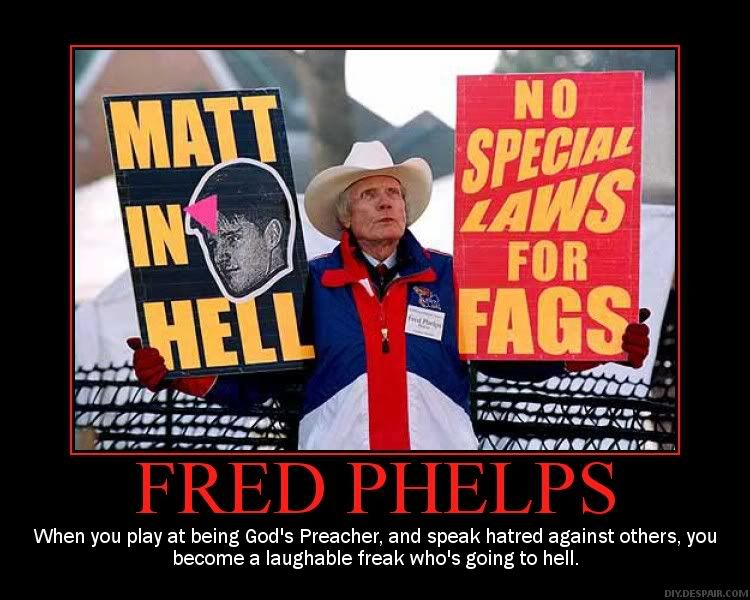
I recently came across a fascinating story about the Reverend Fred Phelps of the Westboro Baptist church. Jon Michael Bell interviewed Phelps and his family in the mid-90’s, but his reporting, under the book title “Addicted to Hate”, was never published due to a dispute with the publisher. Bell’s short, nine-chapter book circulates the Internet like a viral video. It caught my eye because I’m drawn in by stories with complex villains. I tend to view people as multi-dimensional in my life and my writing. Tell me someone is “bad,” and I’ll spend hours working out the counterpoint. The same goes for saints and heroes. I guess I don’t like being told how I should think, and I believe there’s humanity in every individual, no matter how despicable their choices and behaviors. That doesn’t mean I don’t believe in personal responsibility, punishment or making amends. But I feel that by casting folks as pure evil, we miss an opportunity to understand human nature and ultimately to learn from it.
Most people know Fred Phelps as an audacious, gay-hating evangelist. He coined the motto: “God Hate Fags,” and turned it into a communications campaign. He pickets the funerals of people who died from AIDS, and he protests memorials for hate crimes victims, most famously Matthew Shepherd. His views are too extreme for even anti-gay Christian groups like Focus on the Family. He calls these slightly tolerant folks “fag-enablers” or “fags” themselves. He’d be a frightening guy if he hadn’t become a caricature, lampooned on late night talk shows, Howard Stern and, of course, Jerry Springer. “Family values” Republicans dismiss him as a fringe element (Phelps actually campaigned for Al Gore in the 1980’s), and he and his family/congregation (they’re pretty much one in the same) have been barred from entering the UK.
What people might not know is that Phelps had a career as a civil rights attorney in the 60’s and 70’s and helped overturn Jim Crow laws in the Midwest. He even received an award from the NAACP in 1987. Phelps was since disbarred for harassing a female witness and perjury, but he’s an intelligent, well-educated man. It makes me wonder what was the turning point for this guy? What led him to launch into a monolithic campaign to save America by destroying gays? He doesn’t conform to our comfortable beliefs about what makes a person homophobic – lack of education and/or ignorance. I find it very hard to believe that Phelps intellect cannot grasp the concept of human diversity, the fact that homosexuality is not communicable, that AIDS comes from a virus, not a class of people.
When reporter Bells interviewed Phelps’ adult children, some of the answers came out. Two of his sons and one daughter describe terrifying scenes of domestic abuse directed toward them and their mother. It was physical and not surprisingly verbal. One of Phelps’ sons believes that Phelps turned his rage toward gays after his kids were too old to abuse. They paint a portrait of a sadistic man intolerant of any deviation from his authority, and they believe that their siblings who remain loyal to their father (Phelps has a total of 13 children) haven’t come forward about the abuse because they are living in fear.
The picture coming together for me is a person who is paranoid-delusional with a persecution complex rooted in deep-seated insecurity. Phelps attacks those he’s afraid of – children he will one day be unable to control and gays who challenge his shaky hold on masculinity. Somewhere in his development, I think Phelps’ sense of self was deeply fractured, an injury he could only repair by creating a fantasy of self-importance with conspirators always threatening to bring him down. Even when Phelps was working for civil rights, colleagues remember him as fiercely oppositional, a crusader; it was always him against the world. Maybe Phelps was victimized himself as a child. Maybe the abuse was sexual, which is why his rage turned toward gays. None of this is so extraordinary really. There are plenty of people with similar psychological profiles in our mental health system: narcissistic or borderline personality and bi-polar depressives. From a diagnostic standpoint, there is plenty of evidence of Phelps’ maladaptive coping. It lost him his job and his relationships with his family and most certainly many friends. One of his sons also reports that Phelps abused crystal meth.
Still, Phelps manages to function better than most folks with severe mental illness. He’s a functional delusional, not a one-dimensional monster, but dangerous through his destructive acts toward others and himself. A great inspiration for storytelling.

